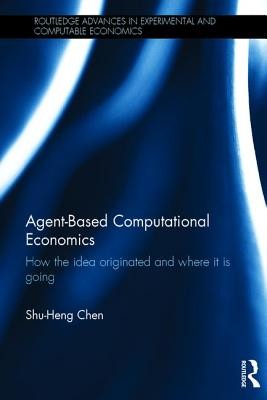
- Išsiųsime per 10–14 d.d.
- Autorius: Shu-Heng Chen
- Leidėjas: Routledge
- ISBN-10: 0415614880
- ISBN-13: 9780415614887
- Formatas: 15.8 x 23.4 x 3.3 cm, kieti viršeliai
- Kalba: Anglų
- Extra -15 % nuolaida šiai knygai su kodu: ENG15
Atsiliepimai
Aprašymas
This book aims to answer two questions that are fundamental to the study of agent-based economic models: what is agent-based computational economics and why do we need agent-based economic modelling of economy? This book provides a review of the development of agent-based computational economics (ACE) from a perspective on how artificial economic agents are designed under the influences of complex sciences, experimental economics, artificial intelligence, evolutionary biology, psychology, anthropology and neuroscience.
This book begins with a historical review of ACE by tracing its origins. From a modelling viewpoint, ACE brings truly decentralized procedures into market analysis, from a single market to the whole economy. This book also reviews how experimental economics and artificial intelligence have shaped the development of ACE. For the former, the book discusses how ACE models can be used to analyse the economic consequences of cognitive capacity, personality and cultural inheritance. For the latter, the book covers the various tools used to construct artificial adaptive agents, including reinforcement learning, fuzzy decision rules, neural networks, and evolutionary computation.
This book will be of interest to graduate students researching computational economics, experimental economics, behavioural economics, and research methodology.
EXTRA 15 % nuolaida su kodu: ENG15
Akcija baigiasi už 4d.11:12:21
Nuolaidos kodas galioja perkant nuo 10 €. Nuolaidos nesumuojamos.

- Autorius: Shu-Heng Chen
- Leidėjas: Routledge
- ISBN-10: 0415614880
- ISBN-13: 9780415614887
- Formatas: 15.8 x 23.4 x 3.3 cm, kieti viršeliai
- Kalba: Anglų
This book aims to answer two questions that are fundamental to the study of agent-based economic models: what is agent-based computational economics and why do we need agent-based economic modelling of economy? This book provides a review of the development of agent-based computational economics (ACE) from a perspective on how artificial economic agents are designed under the influences of complex sciences, experimental economics, artificial intelligence, evolutionary biology, psychology, anthropology and neuroscience.
This book begins with a historical review of ACE by tracing its origins. From a modelling viewpoint, ACE brings truly decentralized procedures into market analysis, from a single market to the whole economy. This book also reviews how experimental economics and artificial intelligence have shaped the development of ACE. For the former, the book discusses how ACE models can be used to analyse the economic consequences of cognitive capacity, personality and cultural inheritance. For the latter, the book covers the various tools used to construct artificial adaptive agents, including reinforcement learning, fuzzy decision rules, neural networks, and evolutionary computation.
This book will be of interest to graduate students researching computational economics, experimental economics, behavioural economics, and research methodology.




Atsiliepimai